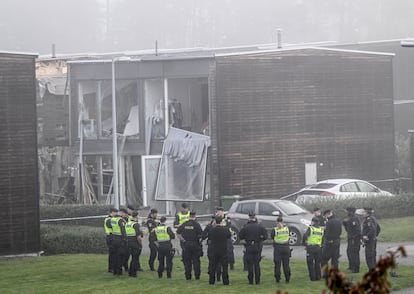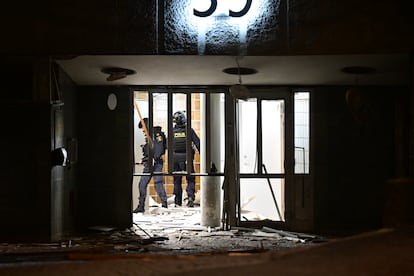Building bombings and 14-year-old hitmen: Organized crime overwhelms Sweden
Power struggles between Swedish mafia clans make the Scandinavian country one of the most violent in Europe


Soha Saad was resting on the sofa in her home when she was killed by a bomb on September 27. She was 24 years old, lived with her brother and parents on the outskirts of the Swedish city of Uppsala, and had just finished university. The young woman, who was about to start a job as a kindergarten teacher, was unaware that her neighbors across the street, the targets of the bombing, belonged to criminal gangs. And days before, like dozens of other criminals, they had fled to another region after the murder of the mother of one of the Swedish mafia bosses; she was shot in her home by two hitmen aged 15 and 19.
Located about 44 miles northwest of Stockholm, Uppsala is a tourist and university town. A quarter of its 230,000 residents are students, many of them foreigners. Like the rest of the major cities, it suffers from the plague of shootings and explosions that has caused more than 400 deaths in the last decade in the Scandinavian country. Last September was shocking in Uppsala. The murder of the mother of Ismail Abdo, alias Jordgubben (The Strawberry), sparked a thirst for revenge that seemed to know no bounds and soon spread to other cities. Even so, the mayor, Erik Pelling, maintains that the situation has improved over the last five years, when he has been at the helm of the municipal government.
Pelling, 47, took office at a time when the city had the worst gun crime statistics in all of Sweden. In 2019, there were 29 shootings; last year, there were 17. In his second term, safety remains a priority for the Social Democratic mayor. The success of some of his policies is most evident in Gottsunda, Uppsala’s most violent neighborhood. The police stopped considering Gottsunda — located four miles from downtown and separated from the rest of the population by a protected forest — to be one of the country’s most dangerous places in December.
It still appears on the list of the 61 most unsafe neighborhoods, but it is no longer ranked at the bottom, which includes 17 other areas, mainly around Stockholm, Gothenburg and Malmö. All the neighborhoods on the list stand out for crime, but they have more in common: high youth unemployment and school failure, low incomes, lower rents and a clear majority of the population is of foreign origin (born abroad or with foreign parents).
“We have to make the people of Gottsunda feel that the authorities have not abandoned them,” Pelling stresses during a bicycle tour of the neighborhood, describing how the area has changed over the past five years. The mayor notes that, when he took office, there were “out of control” streets where the police did not enter. Now, there are many more surveillance cameras, better lighting, private security and a greater police presence. Social education projects and extracurricular activities have also proliferated over the years, and another school and several playgrounds have been built.
Pelling was born into a nonconformist family. In 1936, one of his grandfathers fought in the Spanish Civil War with the International Brigades; his parents moved to Nicaragua for a time after the triumph of the Sandinista revolution. He is convinced that much more can still be done to prevent teenagers from falling into the clutches of the criminal gangs that still operate in the neighborhood. The mayor is particularly pleased with the construction of a light rail system that will connect Gottsunda to the rest of the city, and with the recent opening of a state employment service office. “It took a lot of effort to get them to come, but it is essential for increasing job opportunities.”
In less than 15 years, Sweden has gone from being one of the world’s safest countries to having the highest rate of gun homicides in the entire EU (double that of Croatia, the second highest) and a number of explosions — by bombs or by hand grenades — that is comparable to some countries at war.
The right-wing government that was formed in autumn 2022 came in with the promise to reduce the levels of violence. Led by conservative Ulf Kristersson, the executive branch has increased the number of police nationwide and given officers greater flexibility to perform wiretaps and searches. Gun crime statistics improved slightly in 2023 from the previous year, which set record numbers (391 incidents and 62 deaths). However, there were also 149 explosions, 66% more than in 2022.
Not criminally liable
The spiral of score-settling that the country experienced in September was the worst to date. In less than 20 days, there were over 40 violent episodes and 12 deaths. The mafia clans led by the Strawberry and Kurdiska räven (The Kurdish Fox) — both raised in Uppsala and longtime close friends — clashed with such brutality that the Kristersson government called in the army to assist the police with logistics, explosives handling and forensic work. The Kurdish Fox, who survived two assassination attempts in Turkey over the summer, was arrested in Iran in early October.
The last few months have been relatively quiet in Uppsala. That’s not the case in several areas in the outskirts of Stockholm, where gang violence overwhelms the police and, increasingly, the worst crimes are committed by minors under the age of 15 who are not criminally liable.
Farsta is one of the municipalities in the capital’s metropolitan area where the situation is becoming increasingly serious. Faiza Ali, a 32-year-old Somali salesclerk in a clothing store, arrived in northern Europe as a baby. “I don’t want my child to grow up here,” she says at a bus stop in one of the poorest areas of Farsta. Nearby, a couple of streets away, three people were injured on the 5th when a device exploded in a residential building. Faiza’s father, Abshir, emphasizes that “Sweden is no longer the same” country that gave him refuge in the early 1990s. “I fled one war to end up in another. They are not comparable, the one in Somalia is infinitely more horrific, but at least there I understood what was happening and recognized the danger; not here,” laments Abshir in Arabic, translated into English by his daughter.
Faiza recalls many details of some of the more violent events that have alarmed Farsta’s residents, such as the shooting last June, in which two young men fired 20 bullets at the entrance to the subway station; they killed two men and seriously wounded two women, none of whom were the intended target. “I save what I can in the hopes that one day I will be able to rent a house near the center of Stockholm, where you live away from this nightmare,” Faiza concludes.
Minister of Justice Gunnar Strömmer put the number of people in the country with some kind of link to criminal gangs at 62,000 (one in every 168 inhabitants). Of these, 14,000 are “active members.” “We are talking about a criminality that threatens the system, that controls the drug market through a lot of violence, that silences witnesses, that intimidates social workers, that infiltrates the authorities and political parties,” Strömmer said in December.
As in Farsta, there are many in Gottsunda who aspire to move. Sitting on a bench, three men in their twenties, who prefer to remain anonymous, say they want to become independent as soon as possible and start a new life away from the neighborhood. Dressed in hoodies and smoking electronic cigarettes, the young men — who are unemployed and were born in Iraq and Syria — respond that they do not get into trouble, although they do know people who are currently behind bars. The most willing to talk of the three, and the only one fluent in English, believes that the children capable of murder for hire tend to be “those who from a very young age are the most problematic at school; those who have no future and end up on drugs and brainwashed. For some, killing is easier than studying.”

Sign up for our weekly newsletter to get more English-language news coverage from EL PAÍS USA Edition
Tu suscripción se está usando en otro dispositivo
¿Quieres añadir otro usuario a tu suscripción?
Si continúas leyendo en este dispositivo, no se podrá leer en el otro.
FlechaTu suscripción se está usando en otro dispositivo y solo puedes acceder a EL PAÍS desde un dispositivo a la vez.
Si quieres compartir tu cuenta, cambia tu suscripción a la modalidad Premium, así podrás añadir otro usuario. Cada uno accederá con su propia cuenta de email, lo que os permitirá personalizar vuestra experiencia en EL PAÍS.
¿Tienes una suscripción de empresa? Accede aquí para contratar más cuentas.
En el caso de no saber quién está usando tu cuenta, te recomendamos cambiar tu contraseña aquí.
Si decides continuar compartiendo tu cuenta, este mensaje se mostrará en tu dispositivo y en el de la otra persona que está usando tu cuenta de forma indefinida, afectando a tu experiencia de lectura. Puedes consultar aquí los términos y condiciones de la suscripción digital.








































